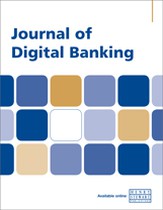Lessons learned from partnerships between banks and FinTechs: A game of value chain transformation
Abstract
After the initial impression that banks and FinTechs are on opposite sides of the same game, it seems that ‘opponents’ have the potential to make successful alliances. But the whole concept of partnership should not be restricted to procurement processes — banks’ legacies in combination with FinTechs’ agility and innovation require deeper transformation and alignment of value chains from the perspective of the end customer, in order to set up a sustainable ecosystem. An opportunity for banks to rapidly consume technology capabilities without building them internally is the only opportunity for banks to be agile enough in the model transformation of the banking business. Banks should focus on convenience, and providing value through embedded advisory relationships within new distribution channels, as well as reducing the information asymmetry and efficiently meeting the regulatory framework. They should leave the tech part to the FinTechs. FinTechs have proved that they can shake the banking industry in terms of their speed and efficiency, accessibility, cost effectiveness, innovation and user-centric approach. Banks, on the other hand, have clearly demarcated their competency fields: regulatory compliance, security and trust, global infrastructure, risk management and incident response.1
The full article is available to subscribers to the journal.
Author's Biography
Danijela Vukoslavović is a member of the Management Board of Addiko Bank Montenegro and is responsible for the following organisational units: Retail Banking Division, Corporate/Small and Medium – sized Enterprises Banking Division, Product Development (Digital Channels and Bancassurance Department) and Marketing Expert Function. Danijela is passionate about advancing and executing the banking strategy and transforming the banking business model. She is experienced in providing comprehensive and customised banking product solutions and is skilled in negotiation, business planning, business process management, analytical skills, banking and credit analysis. Danijela is a strong business development professional with an MSc in banking from the Faculty of Economy and an EMBA degree from Cotrugli Business School. She has managed and initiated changes in business policies, procedures and important processes in the bank, following the strategic goals, with a focus on sales (Retail and SME) and payment cards sectors, alignment and application of EU regulations, data governance and customer relationship manager implementation projects. She is an active speaker and moderator at numerous bank and FinTech conferences in the South East Europe Region.
Ivica Tatar is the primary force behind two leading companies in Montenegro’s IT sector: Logate and Poslovna inteligencija. As the Strategy Lead and Co-founder of Logate and the CEO of Poslovna inteligencija with Solvership Montenegro, he leads both organisations with a strong focus on innovation, product development and client satisfaction. At Logate, Ivica Tatar oversees a team of 70 multidisciplinary IT professionals who are not only experts in software development but also the creators of Logate’s proprietary products. These products are designed to meet the specific needs of telecoms, banks and other industries, setting Logate apart as a leader in the IT market. Simultaneously, as the CEO of Poslovna inteligencija Montenegro, Ivica Tatar manages a team of 30 consultants specialising in implementing advanced decision-support systems (business intelligence [BI]/data warehousing [DWH]/planning). His dual leadership roles allow him to integrate the unique strengths of both companies, maximising the value delivered to clients across the telecom and banking sectors. In recognition of his contributions, Ivica Tatar was awarded the ’Most Successful Manager’ in 2018 by the Association of Managers in Montenegro. He holds a degree from the Faculty of Natural Sciences and Mathematics in Podgorica and completed specialist studies at the Faculty of Organizational Sciences in Belgrade.
